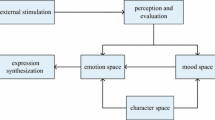Abstract
The Human Computer Interaction (HCI) Technology has emerged in the different fields in applications in computer vision and recognition systems such as virtual environment, video games, e-business and multimedia management. In this paper we propose a framework of designing the Mental State Transition (MST) of a human being or virtual character. The expressions of human emotion can be easily remarked by facial expressions, gestures, sound and other visual characteristics. But the potential MST modeling in affective data are always hidden actually. We analysis the framework of MST and employ DBNs to construct the MST networks and finally the experiment has been implemented to derive the ground truth of the data and verify the effectiveness.
Access this chapter
Tax calculation will be finalised at checkout
Purchases are for personal use only
Preview
Unable to display preview. Download preview PDF.
Similar content being viewed by others
References
Rosalind, W.: Picard: Affective Computing. The MIT Press Cambridge, Massachusetts London, England (1997)
Ekman, P.: Universals and Cultural differences in Facial Expressions of Emotion. In: Cole, J. (ed.) Nebraska Symposium on Motivation, vol. 19, pp. 207–283. University of Nebraska Press, Lincoln (1972)
Plutchik, R.: Emotions: A Psychoevolutionary Synthesis. Harper, Row, New York (1980)
Russell, J.A.: A Circumplex Model of Affect. Journal of Personality and Social Psychology 39, 1161–1178 (1980)
Li, X., Li, Q.: Active Affective State Detection and User Assistance With Dynamic Bayesian Networks. IEEE Trans. on System, Man and Cybernetics-Part A. Systems and Humans, 93–105 (2005)
Cohen, I., Garg, A., Huang, T.S.: Emotion Recognition from Facial Expression using Multilevel HMM. Neural Information Processing Systems (2000)
Peilin, J., Hua, X., Fuji, R., Shingo, K.: An Advanced Mental State Transition Network and Psychological Experiments. In: Yang, L.T., Amamiya, M., Liu, Z., Guo, M., Rammig, F.J. (eds.) EUC 2005. LNCS, vol. 3824, pp. 1026–1035. Springer, Heidelberg (2005)
Tsuji, K., Okuda, T.: Analyses of the Discomforts Aroused by Stimulus Sentences with Reference to Effects of Modality and Gender. The Japanese Journal of Research on Emotion 3(2), 64–70 (1996)
Hua, X., Peilin, J., Shuang, X., Fuji, R., Shingo, K.: A model of mental state transition network. IEEJ Transactions on Electronics, Information and Systems 127(2), 434–442 (2007)
Author information
Authors and Affiliations
Editor information
Rights and permissions
Copyright information
© 2007 Springer-Verlag Berlin Heidelberg
About this paper
Cite this paper
Jiang, P., Xiang, H., Ren, F., Kuroiwa, S., Zheng, N. (2007). The Framework of Mental State Transition Analysis. In: Gelbukh, A., Kuri Morales, Á.F. (eds) MICAI 2007: Advances in Artificial Intelligence. MICAI 2007. Lecture Notes in Computer Science(), vol 4827. Springer, Berlin, Heidelberg. https://doi.org/10.1007/978-3-540-76631-5_100
Download citation
DOI: https://doi.org/10.1007/978-3-540-76631-5_100
Publisher Name: Springer, Berlin, Heidelberg
Print ISBN: 978-3-540-76630-8
Online ISBN: 978-3-540-76631-5
eBook Packages: Computer ScienceComputer Science (R0)




